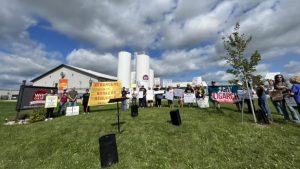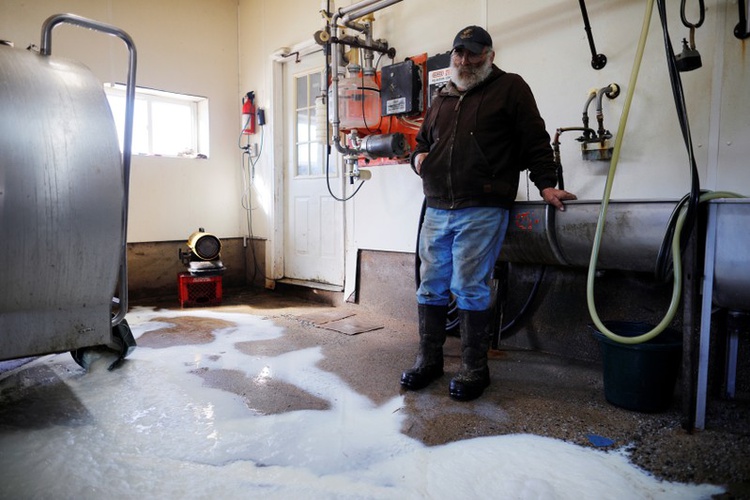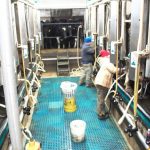
Now state regulators and health experts are investigating whether the contamination could reflect a much broader problem for farms that used similar methods to fertilize their land.
The chemicals on Stone’s farm likely came from biosolids, or nutrient-rich sewage from municipal utilities, that he spread across his fields, according to a report last year by Maine’s Department of Environmental Protection (DEP). The chemicals are known as perfluoroalkyl substances, or PFAS – some of which have been linked to cancers, liver damage, low birth weight and other health problems.
The discovery of contaminated sites in Maine and around the country prompted Maine Governor Janet Mills this month to form a task force to study the extent of PFAS contamination and suggest protective measures. The state DEP says testing for the chemicals is underway at more than 95 sites.
“Staff has been specifically working on identifying farms statewide that may have received sludge and identifying the original source,” department spokesman David Madore said in a statement to Reuters.
Patrick MacRoy, deputy director at the Maine-based Environmental Health Strategy Center, said the contamination at the Stoneridge Farm raises questions about the safety of biosolids used at farms nationwide.
“The Stone case is incredibly troubling because the source of exposure – waste sludge – is something that is also spread across hundreds of farms in Maine and thousands nationally,” he said.
Experts said that far more research is needed to determine how sludge-spreading programs may be contributing to contamination of groundwater, crops, or finished products such as milk.
“Maybe this one farm is an oddball in Maine, but without further testing, there’s no way to be sure,” said Michael Rainey, a former biosolids inspector at the health department in neighboring New Hampshire.
Alan Bjerga, a spokesman for the National Milk Producers Federation, said that his organization believed the Stoneridge case to be an isolated event.
“We see no wide threat to the milk supply,” he said in a statement.
Grease and water-repellent PFAS have been used for decades in cookware, specialty paper, fabrics, firefighting foam and other products. State and federal regulators have been scrambling to set safety standards for human exposure to some of the chemical compounds.
Scores of lawsuits have been filed in pollution cases seeking billions of dollars from chemical manufacturers and industrial PFAS users. Two major cases have already settled in recent years for a combined $1.5 billion.
‘FOREVER CHEMICALS’
Stone and his wife Laura Stone run the Stoneridge Farm on 100 acres of land in southern Maine, one of hundreds of small-scale dairy operations across the U.S. northeast prized for the quality of their milk, cream and butter.
The Stones started spreading treated sewage in the 1980s as part of a state program that would help utilities get rid of the waste and fertilize pastures. They also used one delivery of sludge waste from a paper mill.
Concerns about PFAS in the farm’s milk first arose in 2016, when the local water district found the pollutants – often referred to as “forever chemicals” because they don’t break down easily – in a well it maintained on the Stones’ land.
Stoneridge informed its milk distributor, Oakhurst, and the state DEP. Additional tests found high levels of PFAS in Stoneridge’s milk, soil, hay, and cow manure. The areas of highest soil contamination overlapped with where the sewer district sludge had been heaped, Stone said.
The Environmental Protection Agency has said that biosolids spreading programs are active in all 50 states. In Maine, 66 sites are currently permitted for sludge spreading, according to state data.
The numbers were higher during the years Stoneridge participated in the state-sponsored waste-spreading program, between 1983 and 2004. Data compiled in 2000 by the Toxics Action Network, an environmental group, showed that 226 sites, mostly farms, had sludge-spreading permits.
Much of the regulatory push around PFAS so far has focused on water. In 2016, the Environmental Protection Agency set a lifetime “health advisory” for two of the compounds – PFOS and PFOA, which a growing body of research has linked to health problems. The EPA recommended that drinking water should contain no more than 70 parts per trillion of these chemicals combined.
There’s no federal standard for safe levels in milk. But Maine public health officials said in 2017 that milk with PFOS exceeding 210 parts per trillion should be considered “adulterated” and banned from sale.
So far, this ban has only affected Stoneridge, whose milk had levels as high as 1,420 parts per trillion.
FADING FAMILY TRADITION
Fred Stone, 63, fears he’s nearing the end of a century-old family tradition. The contamination ordeal has already put him in $500,000 of debt, he said. He’s considering selling some land and looking for a job.
“My grandfather, my father, and myself, we’ve all been dairy farmers here,” he said, wearing coveralls and mud-stained rubber boots as he walked the farmland his family bought in 1914.
Until a few weeks ago, Stone was still trying to salvage his dairy operation. He purchased several dozen new cows, installed a $20,000 water-filtration system and stopped using his farm’s hay for feed.
The effort at first seem to work. Last year, test results on his farm’s milk came back clean, and he was allowed to sell milk to Oakhurst again. But PFOS reappeared in the milk within months, causing distributor Oakhurst to permanently end its business relationship with Stoneridge.
“When they dropped us, that was the end of our milk market,” Stone said. “So that was the end of us.”
























